Student agency manifestation in a project-based learning: a case of the Federal University
According to experts, there will be a growing demand for hybrid and multidisciplinary specialists with advanced cognitive skills, emotional intelligence, and technological and social competence by 2030. These professionals will be able to make independent and innovative decisions in a rapidly changing labor market. The system of higher professional education faces the challenge of addressing the quantitative and qualitative shortage of young professionals. In this context, the topic of modernizing personnel training includes the introduction and active promotion of project-based learning. Project-based training should promote the agency of students as young professionals by transferring them within the framework of training from passive behavior to active independent actions, effective interaction with the professional community, disclosure of leadership potential, development of initiative and readiness to design new interdisciplinary solutions. The manifestations of student agency in project-based learning is an urgent issue on the research agenda and management practice of universities. The aim of the study was to investigate the key features of UrFU students' agency, as manifested in their project-based learning experiences. The article presents the findings from a survey conducted among students (N=1,070) using a quota sampling method in 2024 (including sex, training level and major subject). The survey error does not exceed 3 percent. According to the survey results, the relevance of key features of agency and project-based learning was established. It was empirically proved that project-based learning encourages independent, proactive behavior, promotes the development of leadership qualities, and enhances students' innovative potential.
Figures
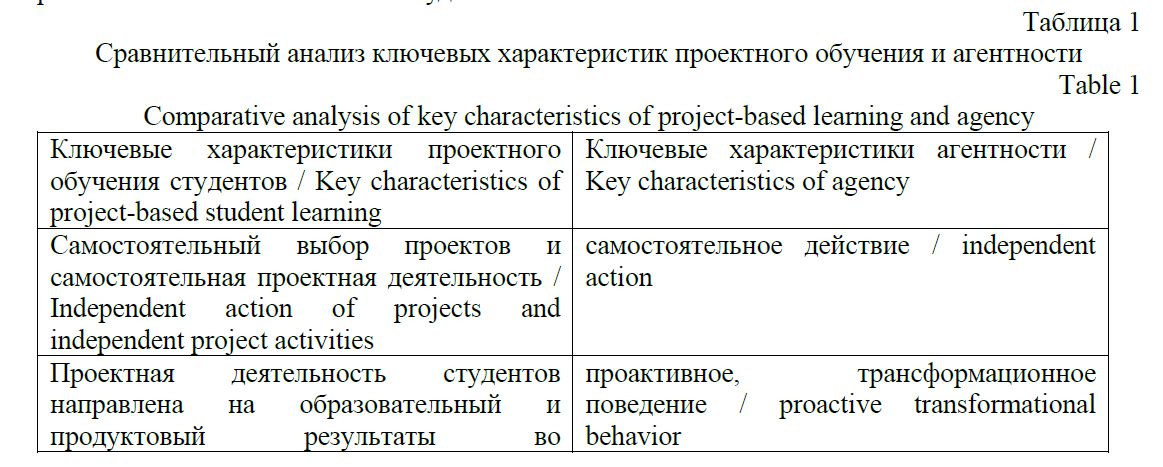





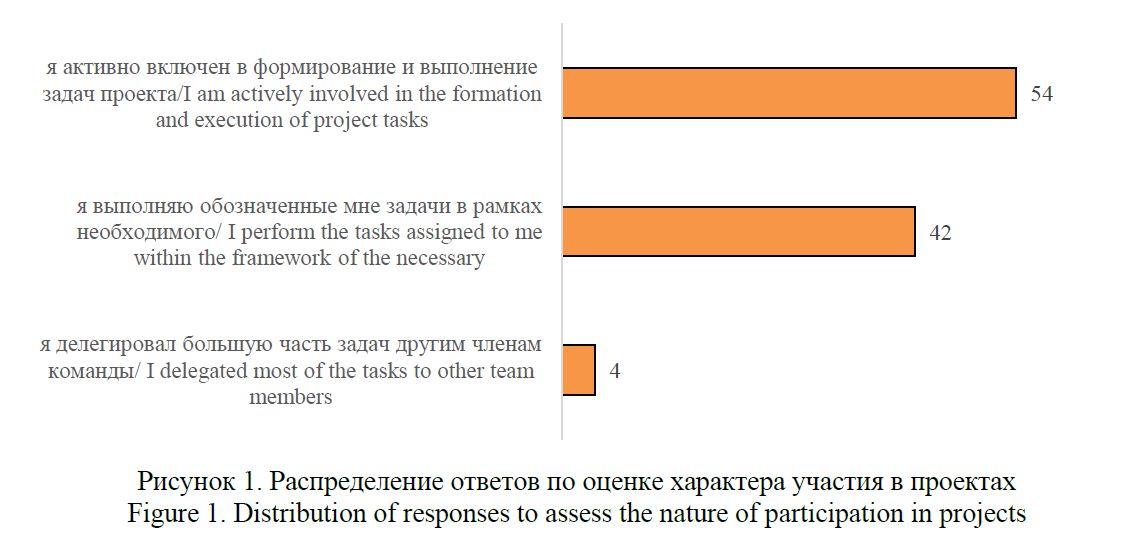
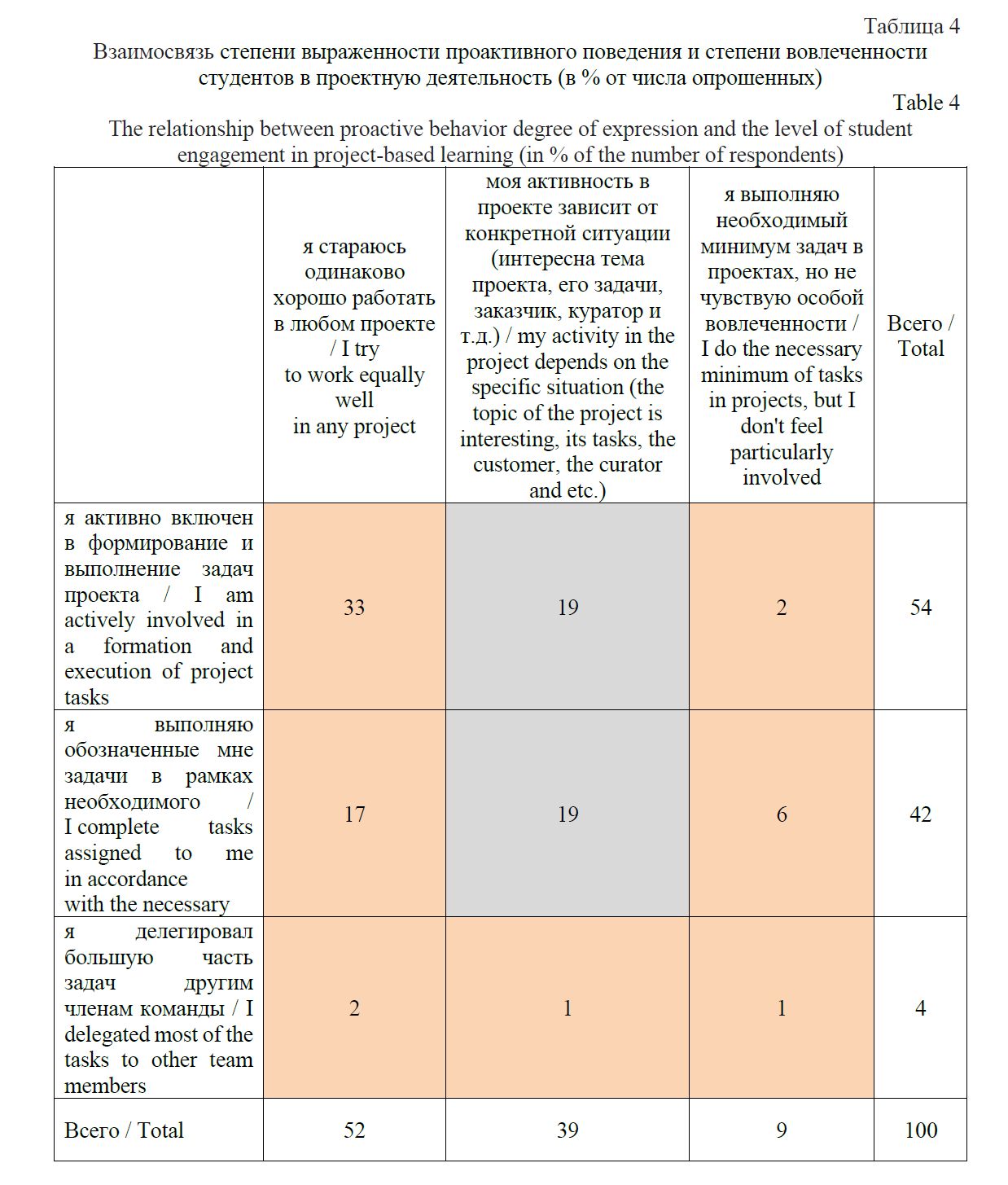
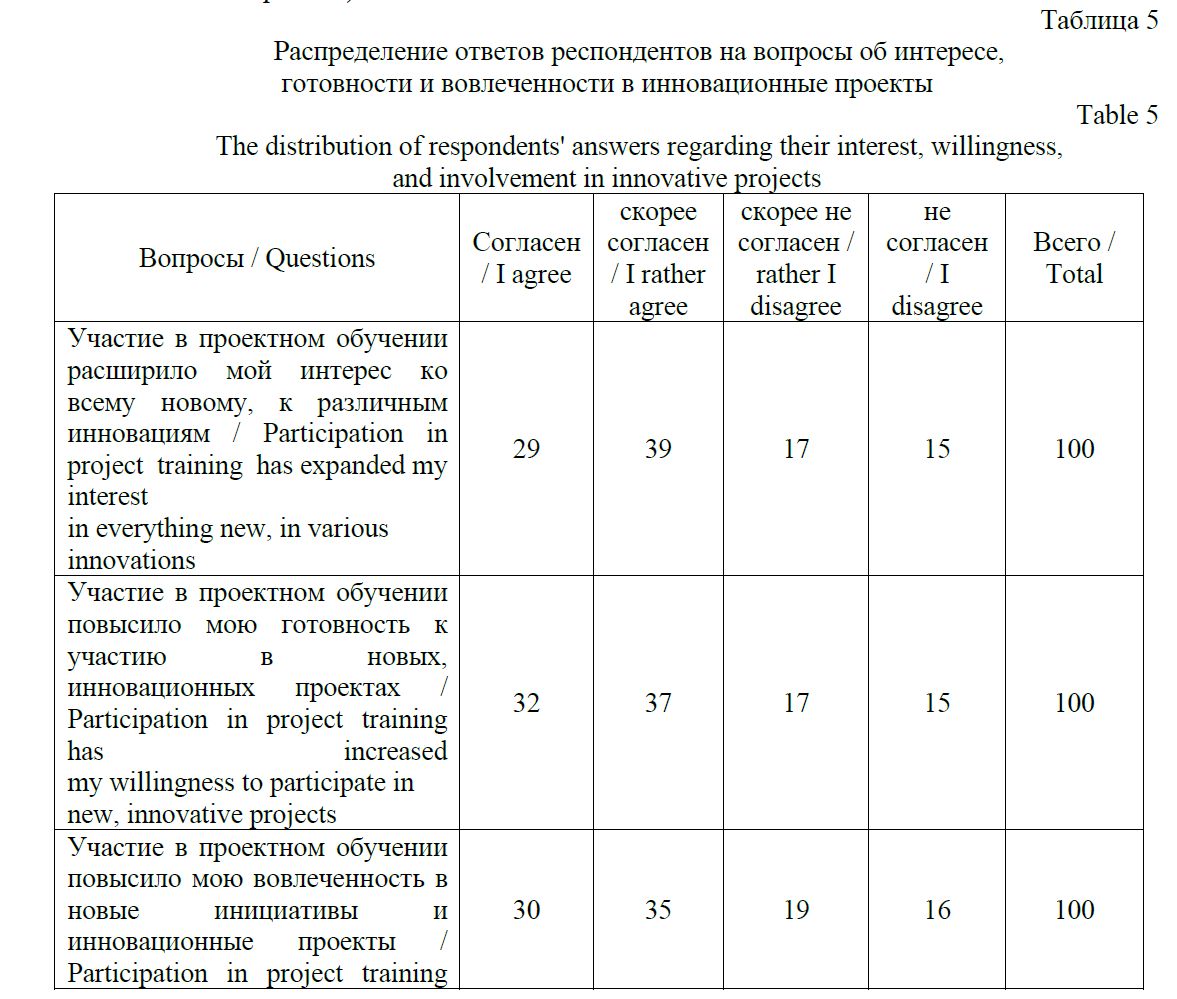
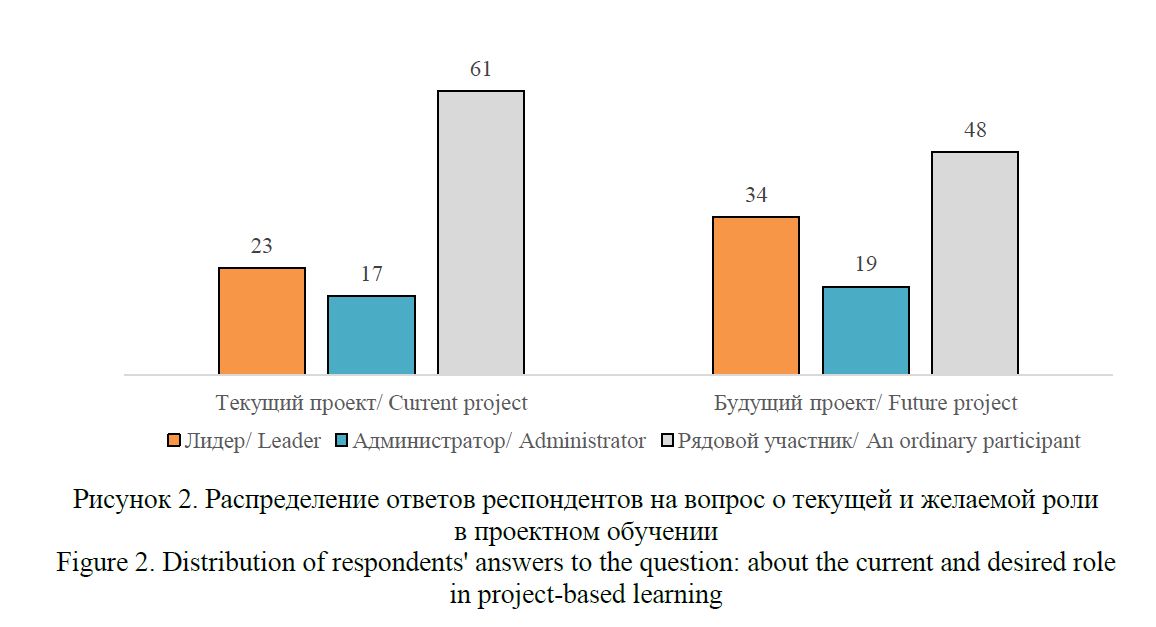
Boronina, L. N., Kulminskaya, A. V., Markina, A. A., Reprintseva, N. E. (2024), “Student agency manifestation in a project-based learning: a case of the Federal University”, Research Result. Sociology and Management, 10 (3), 200-216, DOI: 10.18413/2408-9338-2024-10-3-1-3.


















While nobody left any comments to this publication.
You can be first.
Kuklina, M. V., Trufanov, A. I., Urazova, N. G. and Bondareva, A. V. (2021), “Analysis of the implementation of project-based learning in Russian universities” Modern problems of science and education: online edition, 6. [Online], available at: https://science-education.ru/ru/article/view?id= 31320 (Accessed 15 August 2024). (In Russian)
Giddens, A. (2005), Ustroyenie obshchestva: Ocherk teorii strukturatsii. [The Constitution of Society. Outline of the Theory of Structuration] in Tyurina I. (ed.), Academic Project, Moscow, Russia. (In Russian)
Glibovets, N. N. (2005), “Using YADE (Yava Agent Development Environment) to develop computer systems to support agent-type distance learning”, Educational technologies and Society, 8 (3), 325-345. (In Russian)
Evseeva, A. M., Pozdeeva, S. I. (2024), “Educational communication, engagement and agency as pedagogical phenomena”, Pedagogical Review, (1), 79-89. (In Russian)
Karastelev, V. E., Danilova, V. L. (2022), “Reflexive communication as a condition for the manifestation and development of educational agency of graduate students”, Vector of Science of Tolyatti State University. Series: Pedagogy, psychology, [Online], available at: https://vektornaukipedagogika.ru/jour/ article/view/603/528 (Accessed 15 August 2024). (In Russian)
Morozova, E. V. (2024), “Obuchenie studentov rossyskikh vuzov predprinimatelstvu kak sposob formirovaniya agentnosti” [Entrepreneurial Education of Russian Universities’ Students as a Way to Form Agency], Educational Studies, (1), 185-213. (In Russian)
Pevnaya, M. V., Tarasova, A. N., Telepaeva, D. F. and Protasov, D. S. (2024), “Transformative agency of students as a resource to form civic consciousness in education system”, The Education and Science Journal, 26 (4), 169-200. (In Russian)
Pozdeeva, E. G., Shipunova, O. D. and Evseeva, L. I. (2020), “Agency and integrality as principles of analyzing trends in youth attitudes to science” in Osipov I. D., Pogodin S. N. (ed.), Philosophy of Science: history and modernity: monograph, POLYTECH-PRESS, St. Petersburg, Russia, 179-199. (In Russian)
Sidorkina, E. D., Terekhova, A. V. (2024), “This is what I need!" Development of a psychometric tool for assessing the personal characteristics of students and applicants”, Sovremennoye obrazovanie: soderzhanie, tekhnologii, kachestvo: materialy XXX mezhdunarodnoy nauchno-metodicheskoy konferentsii, Sankt-Peterburg, 12 aprelya 2024 [Modern education: content, technology, quality: materials of the XXX International scientific and methodological conference, St. Petersburg, April 12, 2024], St. Petersburg, Russia, 400-402. (In Russian)
Sorokin, P. S. (2023), “The problem of “agency” through the prism of a new reality: conditions and perspectives”, Sociological research, (3), 103-114. (In Russian)
Sorokin, P. S., Zykova, A. V. (2021), ““Transforming agency” as a subject of research and development in the XXI century: a review and interpretation of international experience”, Monitoring public opinion: economic and social changes, (5), 216-241. (In Russian)
Sorokin, P. S., Frumin, I. D. (2020), “The problem of "structure/action" in the XXI century: changes in social reality and conclusions for the research agenda”, Sociological Research, (7), 27-36. (In Russian)
Sorokin, P. S., Frumin, I. D. (2022), “Education as a Source for Transformative Agency: Theoretical and Practical Issues”, Educational Studies, (1), 116-137. (In Russian)
Strelnikov, S. S. and Turov, R. S. (2022), “Independence: the request of society and the response of the higher education system”, Human Capital, 10 (166), 140-147. (In Russian)
Shapovalova, I. and Genkin (Filonova), Y. (2019), “Online perspective in educational trajectories of youth”, Research Results. Sociology and Management, (4), 91-102. (In Russian)
Adams, F. (2010), Action Theory Meets Embodied Cognition, Cambridge: MA, 229-252.
Brand, M. (1984), Intending and acting: Toward a naturalized action theory, MIT press, Cambridge, MA, USA.
Bratman, M. E. (1987), Intention, plans, and practical reason, Harvard University Press, Cambridge, MA, USA.
Bratman, M. E. (2007), Structures of Agency: Essays, Oxford Academic, New York, USA.
Emirbayer, M. and Mische, A. (1998), What is agency?, American Journal of Sociology, 103 (4), 962-1023.
Velleman, J. D. (1992), What Happens When Someone Acts?, Oxford University Press, 101 (403), 461-481.
Schlosser, M. E. (2019), “Agency”, The Stanford Encyclopedia of Philosophy (Winter 2019 Edition). (84), 3-35.
Pearlin, L. I. and Schooler, C. (1978), The structure of coping, Journal of health and social behavior, (19), 2-21.
Sherer, M., Maddux, J. E., Mercadante, B., Prentice-Dunn, S., Yacobs, B., and Rogers R. W. (1982), The Self-efficacy Scale: Construction and Validation, Psychological Reports, (51), 663-671.
Westlund, A. C. (2009), Rethinking Relational Autonomy, Hypatia, 24 (4), 26-49.
The article was written with the support of the Russian Science Foundation, Project № 24-28-01482 “Project training in the development of professionalism and citizenship of Russian students: the managerial context and the formation of transformative agency”, https://rscf.ru/project/24-28-01482/.